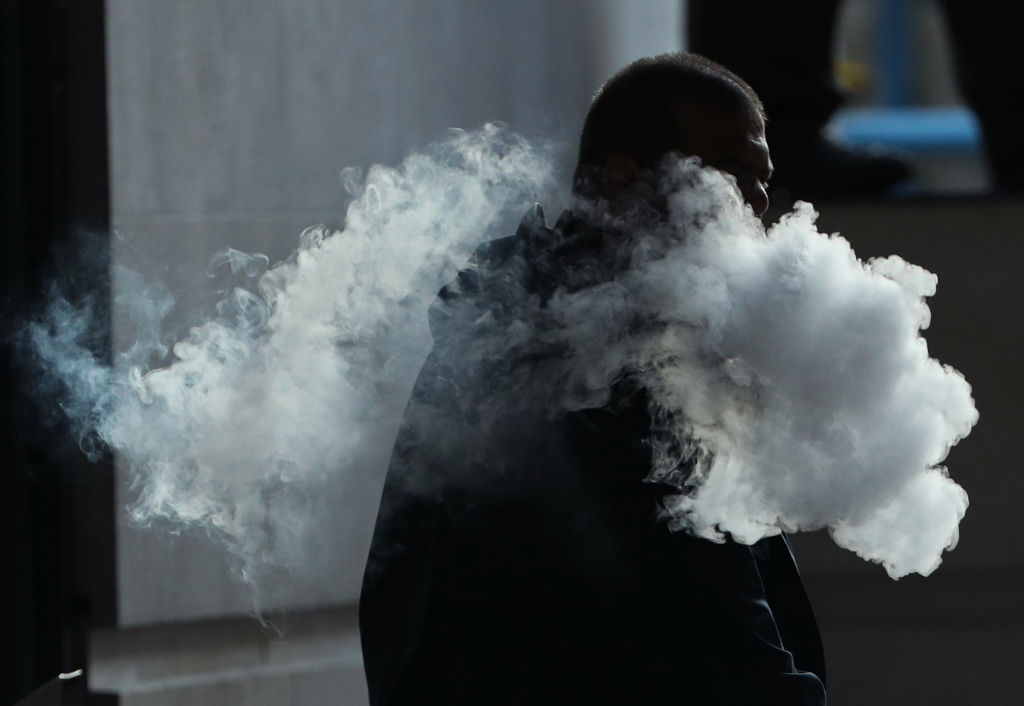
Jack Drennan had tried to quit vaping before, but it took a global pandemic to make him finally follow through.
“I heard you get a lot sicker if you do vape and get coronavirus, so it kind of [pushed me] to quit,” says the Mississippi 20-year-old. Plus, “my mom’s on my ass [about it].”
Speculation about a link between vaping and COVID-19 has grown in recent weeks. News reports have noted that some young, hospitalized COVID-19 patients also vaped, and at a tele-town hall on March 19, a constituent asked New York Rep. Anthony Brindisi about the possibility of a connection. The National Institute on Drug Abuse wrote on its blog that people with substance-use disorders, including those who vape, could be especially hard-hit by COVID-19. In various corners of the internet, fringe theories with little-to-no scientific evidence have popped up making connections between a prior outbreak of vaping-related lung illnesses in the U.S. and COVID-19.
But is there any actual link between vaping and coronavirus? Experts say it’s impossible to say for sure.
Preliminary data show that a fairly high number of U.S. hospitalizations have been among younger adults—the same population known for vaping. At this point, though, that’s just an interesting observation; there is no real data to back up an association between vaping rates and COVID-19 rates in young adults.
The science around vaping is in general evolving. While some studies have shown that vaping can lead to lung damage and other health problems, the products have not been on the market long enough to speak confidently about their long-term effects. The science around COVID-19, which did not exist three months ago, is also still evolving. Putting the two topics together, then, makes for a lot of uncertainty.
Having a preexisting condition—especially one related to respiratory health—increases the chances that someone will experience complications from COVID-19, so it’s reasonable to think vaping could play a part. But since scientists can’t say for sure that vaping leads to lung disease or other chronic conditions, it’s also difficult to say whether it opens people up to more risks associated with COVID-19.
Combustible cigarette-smoking is a clearer cause for concern during the outbreak, says Dr. Michael Siegel, a professor of community health sciences at the Boston University School of Public Health. Early data suggest men are more susceptible to COVID-19 than women, which could be associated with the fact that more men than women smoke—especially in China. Smoking-related conditions, such as heart and lung disease, put people at risk of more severe illnesses, Siegel says. Smoking also inhibits the body’s ability to heal from infections, he adds.
But “with vaping, we just don’t know,” Siegel says. “We don’t have the evidence.”
Yasmin Thanavala, an immunologist at Roswell Park Comprehensive Cancer Center in Buffalo, New York, says some of her group’s animal research suggests vaping may prevent the body from healing from bacterial infections. COVID-19, of course, is a viral infection, but Thanavala says “on a theoretical basis,” a similar effect could apply. There’s not conclusive evidence to say so definitively, though.
Even assuming vaping does cause some amount of lung damage, it’s unlikely that most people who vape have been using e-cigarettes long enough to see the full brunt of it, says Dr. Steve Schroeder, a professor of medicine at the University of California, San Francisco. The exceptions, of course, are patients who got sick during a vaping-related lung injury outbreak last year, which health authorities traced mainly back to THC vape products spiked with the additive vitamin E acetate.
Daniel Ament, a 17-year-old from Michigan who needed a double lung transplant after vaping, is one such patient. “I definitely am [at higher risk for COVID-19],” he says. “[Doctors] didn’t have to tell me that.” Given his past lung injury and fragile immune system post-transplant, Ament is staying inside, wearing a mask almost constantly and visiting his doctors and therapists virtually. His whole family self-quarantined starting last week, to avoid bringing home germs.
E-cigarette users without a known lung injury should not quit if it means they’ll go back to using combustible tobacco, Siegel says. “Relapsing to smoking is the worst thing they could do.” But for recreational vapers, COVID-19 may be the final push needed to quit—and that’s a silver-lining to the situation, Siegel says.
“It’s always better not to be breathing chemicals into your lungs. I would have said that even without this particular outbreak,” he says. “It would certainly be a potential incentive to get people who are vaping to stop, just as a precautionary measure.”
More Must-Reads from TIME
- Cybersecurity Experts Are Sounding the Alarm on DOGE
- Meet the 2025 Women of the Year
- The Harsh Truth About Disability Inclusion
- Why Do More Young Adults Have Cancer?
- Colman Domingo Leads With Radical Love
- How to Get Better at Doing Things Alone
- Michelle Zauner Stares Down the Darkness
Write to Jamie Ducharme at jamie.ducharme@time.com